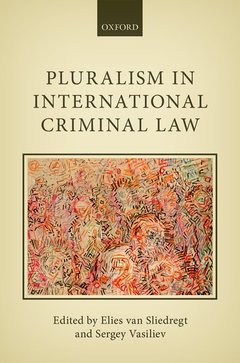Description
Pluralism in International Criminal Law
Coordinators: van Sliedregt Elies, Vasiliev Sergey
Language: English
Subjects for Pluralism in International Criminal Law:
Publication date: 10-2014
Support: Print on demand
Support: Print on demand
Description
/li>Biography
/li>
Despite the growth in international criminal courts and tribunals, the majority of cases concerning international criminal law are prosecuted at the domestic level. This means that both international and domestic courts have to contend with a plethora of relevant, but often contradictory, judgments by international institutions and by other domestic courts. This book provides a detailed investigation into the impact this pluralism has had on international criminal law and procedure, and examines the key problems which arise from it. The work identifies the various interpretations of the concept of pluralism and discusses how it manifests in a broad range of aspects of international criminal law and practice. These include substantive jurisdiction, the definition of crimes, modes of individual criminal responsibility for international crimes, sentencing, fair trial rights, law of evidence, truth-finding, and challenges faced by both international and domestic courts in gathering, testing and evaluating evidence. Authored by leading practitioners and academics in the field, the book employs pluralism as a methodological tool to advance the debate beyond the classic view of 'legal pluralism' leading to a problematic fragmentation of the international legal order. It argues instead that pluralism is a fundamental and indispensable feature of international criminal law which permeates it on several levels: through multiple legal regimes and enforcement fora, diversified sources and interpretations of concepts, and numerous identities underpinning the law and practice. The book addresses the virtues and dangers of pluralism, reflecting on the need for, and prospects of, harmonization of international criminal law around a common grammar. It ultimately brings together the theories of legal pluralism, the comparative law discourse on legal transplants, harmonization, and convergence, and the international legal debate on fragmentation to show where pluralism and divergence will need to be accepted as regular, and even beneficial, features of international criminal justice.
Elies van Sliedregt is Professor of Criminal Law, Dean of the Faculty of Law, and Director of the Center for International Criminal Justice at the Vrije Universiteit Amsterdam. She previously worked as associate professor at Leiden University and as a lecturer at Utrecht University and held visiting fellowships in Cambridge, Oxford, Bologna, and at the University of New South Wales, Sydney. Van Sliedregt was visiting professional with Chambers at the International Criminal Court (2010) and fellow-in-residence at the Netherlands Institute for Advanced Studies in the Humanities and Social Sciences (2011). She is a regular speaker at international conferences and has published extensively in the field of international and European criminal law. Sergey Vasiliev is Postdoctoral researcher at the Faculty of Law, Vrije Universiteit Amsterdam; formerly research fellow at the Amsterdam Center for International Law, University of Amsterdam; member of International Expert Framework on International Criminal Procedure. He is the author and editor of several publications in international and comparative criminal law.
© 2024 LAVOISIER S.A.S.




